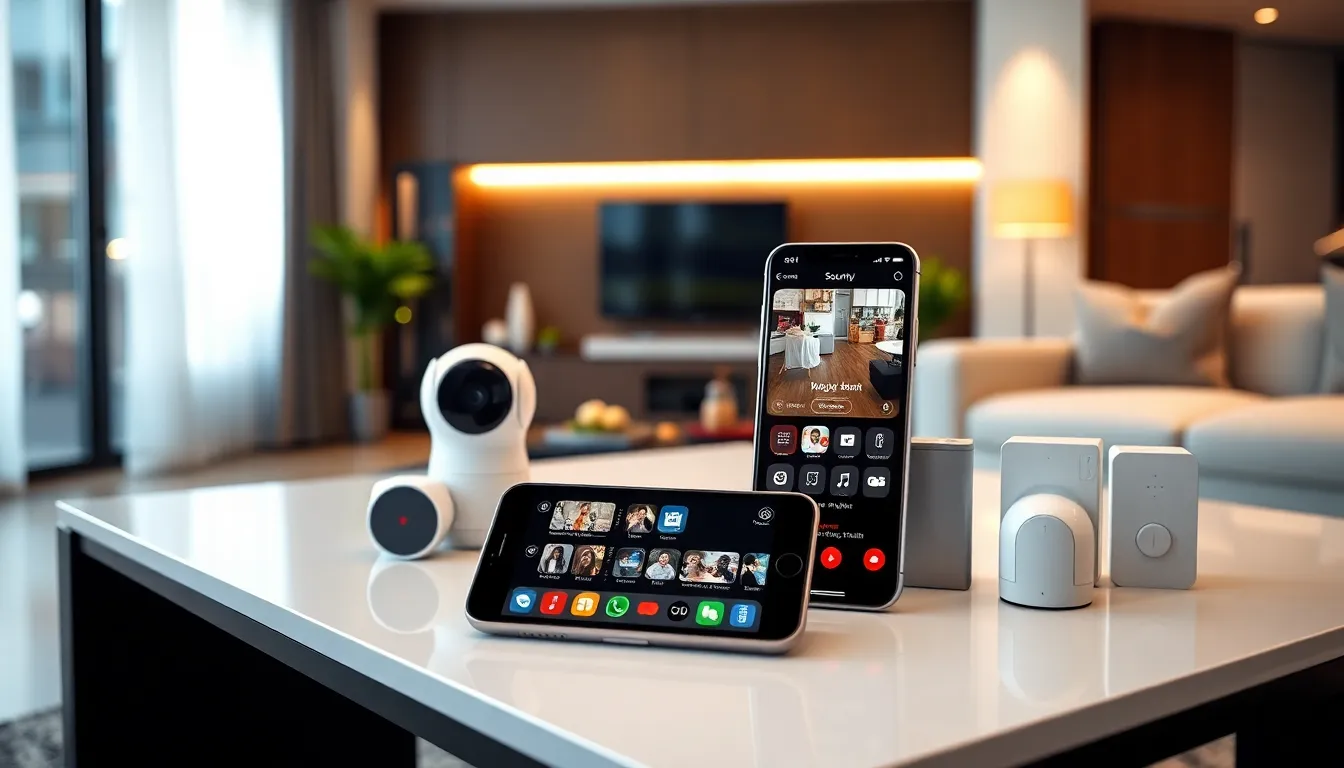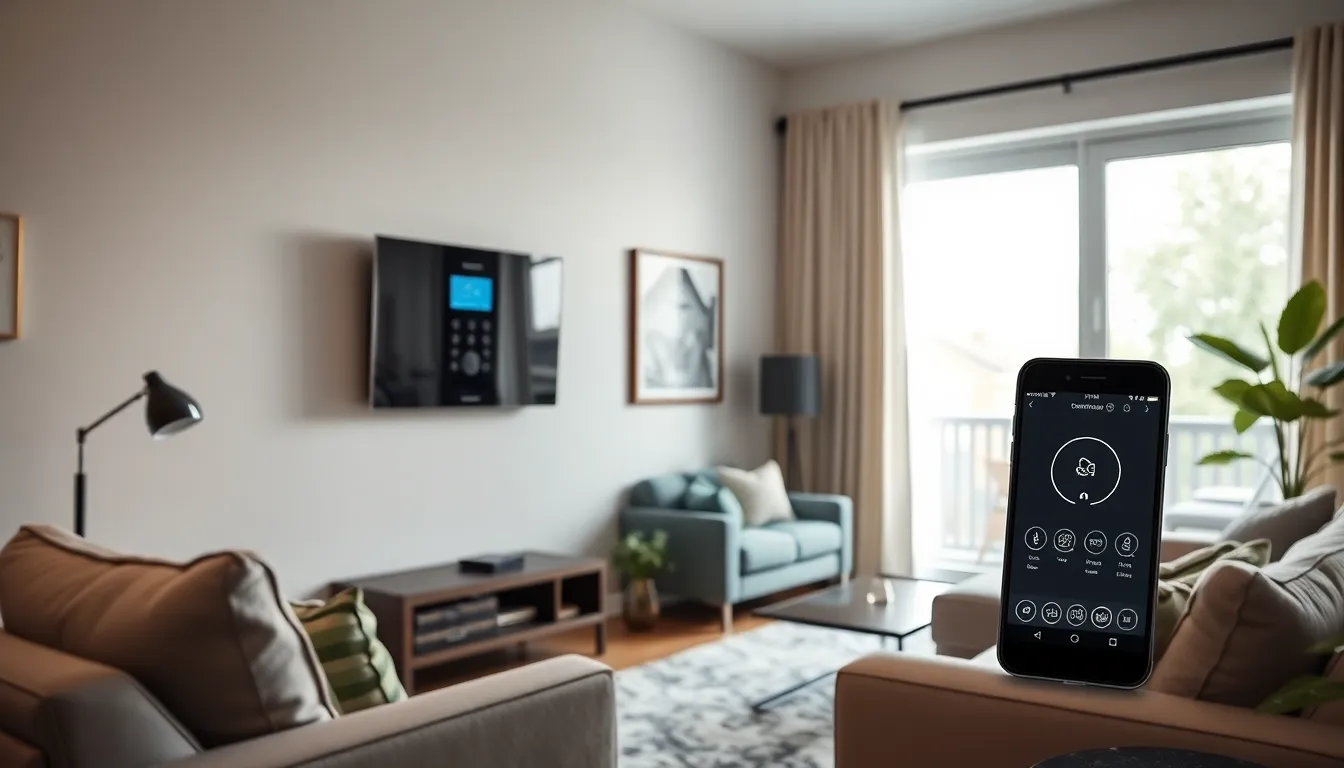In a world where security is a top priority, smart alarm systems have emerged as game-changers. These innovative devices not only protect homes but also offer peace of mind with advanced features that traditional systems lack. With the ability to connect to smartphones and integrate with other smart home devices, they provide real-time alerts and remote monitoring, making security more accessible than ever.
As technology evolves, so do the threats to personal safety. Smart alarm systems adapt to these challenges, utilizing cutting-edge technology like motion sensors and facial recognition. They empower homeowners to take control of their security, ensuring that they stay one step ahead of potential intruders. Understanding the benefits and functionalities of these systems can help individuals make informed decisions about their home security.
Table of Contents
ToggleOverview of Smart Alarm Systems
Smart alarm systems incorporate advanced technology to elevate home security. They feature smartphone connectivity, allowing users to monitor their premises in real-time from remote locations. These systems often integrate seamlessly with other smart home devices, enhancing the overall security framework.
Smart alarm systems utilize various innovative technologies, including motion sensors, glass break detectors, and facial recognition. Motion sensors activate alerts when detecting unusual movements. Glass break detectors monitor for the sound of breaking glass, alerting homeowners to potential intrusions. Facial recognition technology identifies known individuals and sends notifications for unrecognized faces.
The benefits of smart alarm systems extend beyond detection. Many systems offer options for video surveillance, enabling users to view live feeds or recorded clips from their cameras. This combination of features ensures comprehensive surveillance, supporting quick responses to incidents.
Moreover, these systems frequently include customizable settings. Homeowners can adjust sensitivity levels, choose alert types, and set specific schedules for monitoring. This adaptability caters to individual needs and enhances user experience.
Smart alarm systems also provide integration with monitoring services. Professional monitoring can alert local authorities in emergencies, increasing the chances of a swift response. Additionally, many systems can be monitored through mobile applications, ensuring that homeowners stay informed of activities at their properties.
Overall, understanding the functionalities of smart alarm systems equips homeowners with the knowledge to select optimal security solutions. They deliver robust protection, combining technology and convenience for peace of mind.
Key Features of Smart Alarm Systems

Smart alarm systems provide a range of features designed to enhance home security and user convenience. Understanding these key functionalities helps homeowners select the right system for their needs.
Remote Access and Control
Remote access enables users to monitor their properties from anywhere. With dedicated mobile applications, individuals can receive real-time notifications and view live camera feeds. Control over the alarm system remains in the user’s hands, allowing them to arm or disarm the system remotely. Automation features let homeowners customize schedules for activating or deactivating alarms, providing flexibility in managing their security.
Integration with Smart Home Devices
Smart alarm systems integrate seamlessly with various smart home devices. They can connect with smart locks, lighting systems, and security cameras to create a cohesive security environment. This integration allows for automated responses, such as turning on lights when an intrusion is detected or locking doors after the alarm activates. Compatibility with popular smart home assistants enhances voice control functionalities, improving user convenience.
Customizable Alerts and Notifications
Customizable alerts provide flexibility in managing security awareness. Users can tailor notifications to receive specific updates, such as movement detection or door sensor activations. Different alert types ensure individuals receive information relevant to their preferences, reducing the chance of alarm fatigue. Custom settings allow adjustments for sensitivity levels, ensuring the system responds appropriately to actual threats while minimizing false alarms.
Types of Smart Alarm Systems
Smart alarm systems can be categorized by their installation methods and levels of expertise required. Understanding these categories helps users select the right system for their security needs.
Wireless vs. Wired Systems
- Wireless Systems: Wireless smart alarm systems offer flexibility and ease of installation. They require no drilling or extensive wiring, making them suitable for renters. Battery-operated components ensure uninterrupted operation even during power outages. These systems connect via Wi-Fi or cellular networks, allowing for remote access and control through mobile devices.
- Wired Systems: Wired smart alarm systems provide a stable connection with less interference from environmental factors. These systems require professional installation, as they involve running cables through walls and ceilings. Wired systems often feature higher durability and reliability, making them a preferred option for long-term use in permanent homes.
DIY vs. Professionally Installed Systems
- DIY Systems: DIY smart alarm systems empower users to configure and customize their security setups. Available as pre-packaged kits, these systems often include all necessary hardware and user-friendly instructions. Users save on installation costs and can modify their configurations as needed. However, they may lack some advanced features or professional support.
- Professionally Installed Systems: Professionally installed smart alarm systems ensure comprehensive security assessments and tailored solutions. Trained experts install the system, ensuring optimal placement of sensors and cameras. These systems often come with the added benefit of professional monitoring services, enhancing security through real-time alerts and immediate responses to emergencies.
Benefits of Smart Alarm Systems
Smart alarm systems offer numerous advantages that enhance security and simplify home management. Homeowners can ensure robust safety and convenience through innovative features.
Enhanced Security
Enhanced security remains a primary benefit of smart alarm systems. These systems utilize advanced technologies such as motion sensors, glass break detectors, and facial recognition. Motion sensors detect unusual movements, triggering alerts and enabling immediate responses. Glass break detectors monitor for specific sounds, ensuring comprehensive coverage. Many systems also feature video surveillance, allowing real-time monitoring and recorded footage for better safety. Integration with professional monitoring services adds another layer, as these services can promptly notify local authorities during emergencies.
Convenience and Flexibility
Convenience and flexibility are vital features of smart alarm systems. Users can access and control their systems remotely through mobile applications. This functionality enables homeowners to monitor properties from anywhere at any time. The ability to customize alerts and notifications further enhances user experience, allowing adjustments to sensitivity levels and communication preferences. Smart alarm systems can seamlessly integrate with other devices, such as smart locks and lights, creating automated responses to security events that enhance overall home convenience.
Cost-Effectiveness
Cost-effectiveness offers an additional advantage for smart alarm systems. While initial investments may vary, these systems typically reduce long-term security expenses. DIY installations often save users labor costs, and many providers offer flexible payment plans for professionally installed systems. Insurance companies frequently provide discounts for homes with smart security systems, reflecting lower risk profiles. By reducing theft and damage through enhanced monitoring and alert systems, smart alarm devices can contribute to overall financial savings.
Smart alarm systems are transforming home security by offering advanced features that enhance safety and convenience. With real-time monitoring and customizable alerts, homeowners can stay informed and in control from anywhere. The integration with other smart devices provides a seamless experience, ensuring that security measures are both effective and user-friendly.
Investing in a smart alarm system not only boosts security but also offers long-term financial benefits. As technology continues to evolve, these systems will likely become even more sophisticated, making them an essential component of modern home protection. Embracing smart alarm systems is a proactive step toward ensuring peace of mind and safeguarding loved ones.




